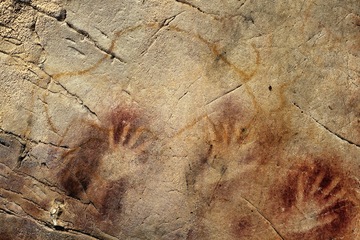
They make up a stable fraction of the population, yet their presence is often invisible: left-handers.
Yet despite decades of research, very little is known about why some people are left-handed. Scientists have proposed causes ranging from genes, to damage in utero, to an edge in fistfights to explain why southpaws make up 10 percent of the world's population.
And while there aren't many obvious differences between lefties and righties, southpaws tend to excel at visual and spatial tasks, and seem to be overrepresented amongst geniuses. [Southpaw Stats: 11 Fun Facts About Lefties ]
Evolutionary roots
While the origin of left-handedness is a mystery, the advantage of favoring one hand over another is clear.
"The reason for handedness is speed," said Stanley Coren, a psychologist at the University of British Columbia and author of "The Left-Hander Syndrome: The Causes and Consequences of Left-Handedness" (Vintage, 1993).
Defaulting to one hand for any given task can save precious time, which could have meant the difference between life and death for ancient humans, Coren said.
Get the world’s most fascinating discoveries delivered straight to your inbox.
Stable minority
But no one knows why lefties became a stable minority. Whereas many animals favor one or another paw, the number of righties and lefties is roughly equally distributed in most animals.
But between 5 percent and 20 percent of people are lefties in different populations, said Violaine Llaurens, an evolutionary biologist at the CNRS in France.
"In every population of the world studied so far, we always find a minority of left-handed people," Llaurens told LiveScience.
One 2012 study found that societies that prize cooperation and as a result do things such as sharing tools more will tend to have more people with same-hand dominance, while societal competition will have the opposite effect.
Another hypothesis is that being a lefty is advantageous, but only when it's relatively rare, Llaurens said.
In fistfights, a surprise swing from the left can provide an edge, but only if such attacks are uncommon. Better fighting could directly lead to higher survival, or indirectly, because better warriors might earn more prestige, have more access to women and have more children, Llaurens told LiveScience.
Genes or environment?
While several researchers have found a few genes implicated in handedness, many genes are probably at play.
And the environment clearly plays a big role: Identical twins often have different dominant hands, Llaurens said.
About half of left-handedness may be a byproduct of damage during fetal development or birth, Coren told LiveScience. Studies have found southpaws have higher rates dyslexia, schizophrenia and immune problems, such as allergies and lupus.
To explain this, scientists have proposed that all people are wired to be right-handed, but damage to the brain has the unintended side effect of forcing the brain to rewire to be left-hand dominant, he said.
Llaurens is skeptical of that hypothesis, however: It's more likely that in early 20th-century case reports, doctors noted when patients were lefties because it was unusual, she said. That would lead to a seeming overrepresentation of southpaws in unhealthy populations.
Because males are overrepresented among lefties, some scientists propose exposure to testosterone in the womb may affect handedness.
Subtle differences
Lefties may have a higher propensity to certain health problems, but they are also overrepresented amongst geniuses, Coren said.
Four of the last seven presidents have been lefties, and Albert Einstein, Benjamin Franklin, Isaac Newton and Charles Darwin were southpaws as well.
Lefties tend to excel in fields that require excellent visual-spatial abilities, such as architecture and graphic design, he said. Southpaws are also overrepresented among chess masters, but tend to be underrepresented in science, Coren said.
Follow Tia Ghose on Twitter @tiaghose. Follow LiveScience @livescience, Facebook & Google+. Original article on LiveScience.com.

Tia is the editor-in-chief (premium) and was formerly managing editor and senior writer for Live Science. Her work has appeared in Scientific American, Wired.com, Science News and other outlets. She holds a master's degree in bioengineering from the University of Washington, a graduate certificate in science writing from UC Santa Cruz and a bachelor's degree in mechanical engineering from the University of Texas at Austin. Tia was part of a team at the Milwaukee Journal Sentinel that published the Empty Cradles series on preterm births, which won multiple awards, including the 2012 Casey Medal for Meritorious Journalism.


